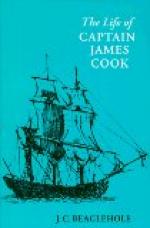On the 23rd they were able to relieve a small French boat, from Ferrol to Corunna, which had been blown far off her course, and had been short of water for a fortnight. The day following they fell in with three Spanish men-o’-war; Cook says: “The sternmost hoisted English colours and fired a gun to leeward, and soon after hoisted his own proper colours, and spoke with the Adventure.” It appears she enquired who they were, and where they were going, and finally wished them a good voyage. This account did not satisfy Mr. Forster, who waxes eloquent and describes the event as “a scene so humiliating to the masters of the sea.” He must have formed a strange opinion of Cook if he thought for a moment he was one to put up silently with anything humiliating to the British flag. Marra, in his Journal, points out that the build and rig of the ships were unusual for men-o’-war, and that when the Spaniards found they had stopped king’s ships, they “made a proper apology, and very politely took leave, wishing them a good voyage.”
The first loss.
At Madeira, where they arrived on 29th July, they were kindly received by Mr. Loughnan, a merchant of Funchal, who entertained some of the party at his house throughout the stay, obtained permission for the Forsters to explore the island, and procured for the ships the stores that were required. Here Cook, with his eye on the scurvy, purchased as many onions as he thought would keep good, and ordered them to be served out regularly to the crews as long as they lasted. A further stock of fresh food in the shape of fowls, pigs, goats, and fruits—chiefly oranges and bananas—was laid in at Port Praya, where they had called for water. On the 19th the first death occurred; one of the carpenter’s mates, Henry Smook, was at work on one of the scuttles and, falling overboard, was seen under the stern; every effort was made to save him, but it was too late. Cook says he was a good, steady man, whose loss was often felt during the voyage.
On 27th August Cook learnt that the Adventure had also had her losses. Two midshipman, Lambrecht and Kemp, had died of fever, brought on, Captain Furneaux believed, by bathing and drinking too much water under the hot sun of Port Praya. At this time the Resolution had a clean bill of health, but for fear lest the heavy rains, to which they were continually subjected, might cause sickness, the ship was constantly fumigated, washed down, and thoroughly dried by means of stoves, as advised by Captains Pallisser and Campbell, with satisfactory results. On nearing the Cape a sharp but unavailing look-out was kept for a bank which had been reported, and on 30th October they arrived in Table Bay. The run from home was considered to have been good, as they had in great measure escaped the calms they had been told to expect at that season of the year, and the currents, though very strong, had only caused a difference between the longitude obtained by observation and that by dead reckoning of three-quarters of a degree, so Cook concluded that those north of the Equator in the one direction were balanced by those to the south in the contrary one.




